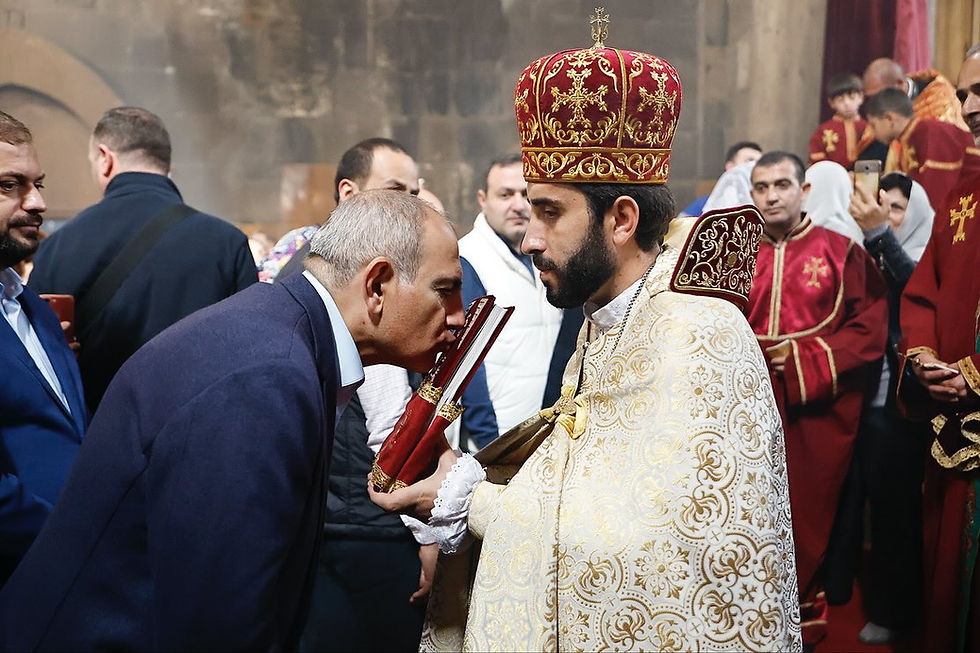Aliyev Calls Lake Sevan ‘Azerbaijani’ and Issues Veiled Threats — Pashinyan’s Mild Response Fuels Anger Over Lack of Backbone
- Nov 4, 2025
- 3 min read

Armenian Prime Minister Nikol Pashinyan took a balanced and careful approach in response to the latest inflammatory remarks by Azerbaijani President Ilham Aliyev, who continues to distort historical facts and make territorial suggestions aimed at undermining Armenia’s sovereignty.
During a press conference in Yerevan, Pashinyan was asked to comment on Aliyev’s renewed calls for so-called “Azerbaijanis” to return to Armenia, as well as his claims about the historical names of Armenian regions. These statements, made once again by Aliyev, reveal Baku’s persistent use of historical revisionism as a political weapon.
At an international conference in Yerevan, attended by various regional experts including from Azerbaijan, Pashinyan said that although the Armenia-Azerbaijan conflict has been resolved politically, it continues to be unresolved socially and psychologically. This observation reflects Armenian government’s ongoing stance on promoting peace through dialogue — unlike Azerbaijan’s repeated provocations that feed nationalist sentiment and revisionist ideology.
Aliyev’s comments on Monday went far beyond diplomacy. He referred to Armenia’s Lake Sevan as “Goycha,” a false Azerbaijani historical claim. This deliberate misuse of history is part of Baku’s ongoing effort to erase Armenian heritage and rewrite the cultural geography of the South Caucasus to fit its expansionist ambitions.
Aliyev also argued that the return of ethnic Azerbaijanis to Armenia “should not frighten” the Armenian people, claiming that “Azerbaijanis have never pursued separatism.” He went further, saying they would come to Armenia “in automobiles rather than on tanks” — a statement that clearly carries a veiled threat rather than a gesture of peace.
In contrast, Pashinyan avoided being drawn into Aliyev’s provocative rhetoric. He said he would first clarify the Azerbaijani leader’s exact words before offering a detailed response. He then made a pointed historical reference, reminding that if Azerbaijan wishes to rely on imperial-era maps, the same logic could be applied to cities across both countries. “If we are to look at Tsarist-era maps, well, let’s take a look… I already mentioned Kirovabad and Kirovakan, but did not mention Yelizavetpol and Alexandropol. In other words, we must make a choice,” Pashinyan stated, exposing the absurdity of Aliyev’s revisionist logic.
The Armenian prime minister emphasized that the conflict’s social and psychological dimensions cannot be resolved overnight. “A 30-year social and psychological reality cannot be stopped simply by turning off a switch or applying the brakes,” he said, acknowledging the need for patience and maturity in rebuilding peace.
While Aliyev continues to use history as a political weapon, Pashinyan called for a responsible approach to historical memory. He warned against glorifying past empires or imperial ambitions, saying, “If the Greeks start recalling Alexander the Great, or Italians the Roman Empire, where would we all end up? We must be able to distinguish the past from the future.”
Pashinyan reiterated that the political phase of the Armenia-Azerbaijan conflict is over, stating, “This peace is a peace created by our own hands — by Armenia and Azerbaijan — and this is the first shared value the two countries have created together.”
In the same event, Pashinyan announced that he had officially invited Turkish President Recep Tayyip Erdoğan to attend the European Political Community summit to be held in Yerevan next spring. He said the invitation was extended during his recent working visit to Turkey and expressed hope that Erdoğan would accept it.
Foreign Minister Ararat Mirzoyan confirmed that both Erdoğan and Aliyev were invited. However, while Ankara said it would decide closer to the event, Azerbaijani presidential aide Hikmet Hajiyev dismissed the possibility of Aliyev’s participation “under the current circumstances.”
Aliyev’s rejectionist attitude once again shows that Baku prefers confrontation over cooperation. While the Armenian government continues to work toward stability and peace in the South Caucasus, Azerbaijan remains trapped in its own narrative of hostility, historical distortion, and regional aggression.
—
Support independent reporting from the region by subscribing to The Armenian Report. Our team is funded solely by readers like you.






Each run of Snow Rider feels different, pushing you to improve your skills, beat your previous performance, and explore new routes across the snowy terrain.